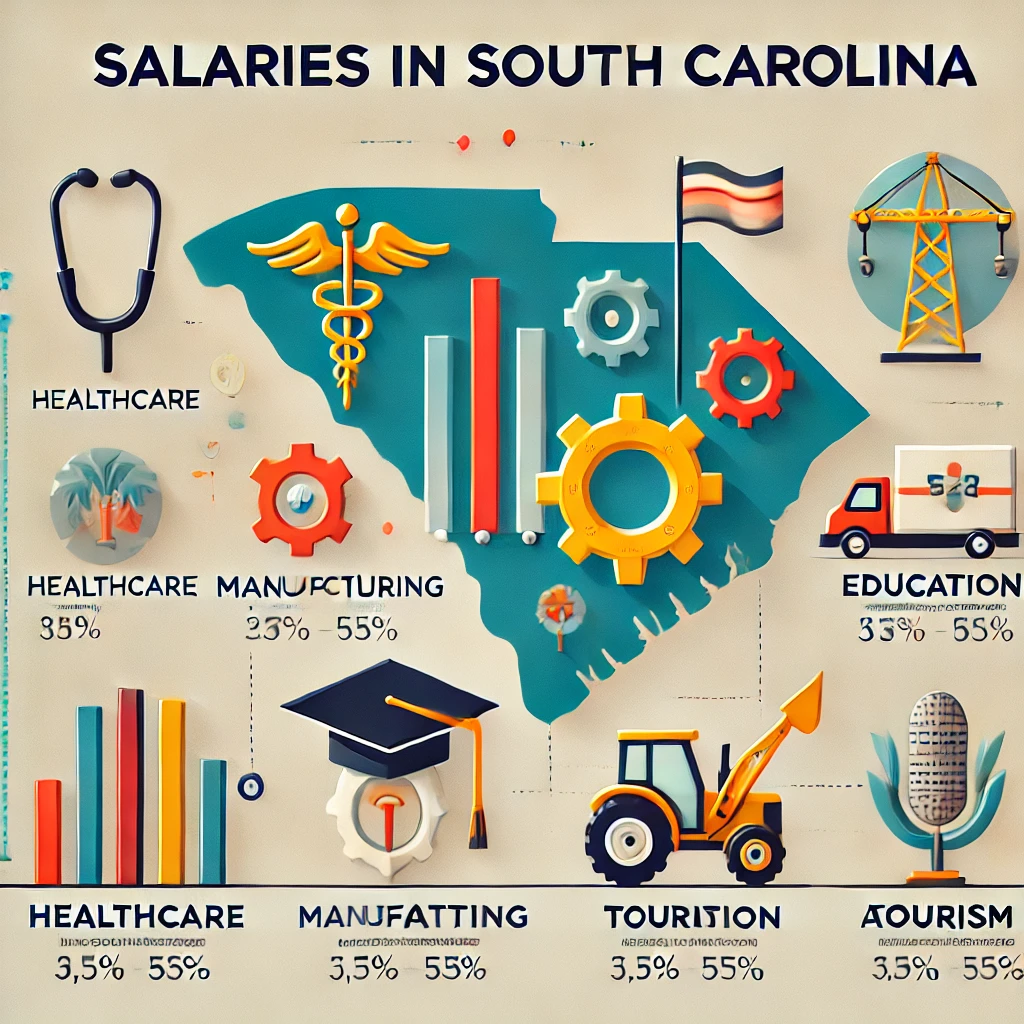South Carolina, known for its warm climate, historic charm, and vibrant economy, provides a wide array of employment opportunities across multiple industries. The state’s economic landscape includes manufacturing, healthcare, education, tourism, and agriculture, each contributing significantly to the overall job market. Understanding the salary trends in South Carolina is essential for job seekers, employers, and policymakers.
General Salary Trends
The median household income in South Carolina is approximately $63,000, which is slightly below the national average. This is reflective of the state’s mix of urban and rural areas, where cost of living and salary levels vary widely. Urban centers like Charleston, Columbia, and Greenville generally offer higher wages due to the concentration of industries and opportunities.
Salaries by Industry
- Healthcare and Social Assistance
- Healthcare is one of the largest sectors in South Carolina, supported by prominent institutions like Prisma Health and the Medical University of South Carolina (MUSC).
- Average salaries:
- Physicians: $210,000–$270,000 annually.
- Registered Nurses (RNs): $65,000–$85,000 annually.
- Medical Assistants: $30,000–$40,000 annually.
- Manufacturing
- South Carolina has a robust manufacturing sector, particularly in automotive and aerospace industries, with companies like BMW and Boeing having a significant presence.
- Average salaries:
- Aerospace Engineers: $85,000–$120,000 annually.
- Skilled Tradespeople: $40,000–$60,000 annually.
- Production Workers: $30,000–$45,000 annually.
- Education Services
- Education plays a pivotal role in South Carolina’s economy, with universities like Clemson and the University of South Carolina leading the way.
- Average salaries:
- Postsecondary Professors: $70,000–$110,000 annually.
- K-12 Teachers: $45,000–$65,000 annually.
- Education Administrators: $75,000–$115,000 annually.
- Tourism and Hospitality
- Tourism is a key driver of South Carolina’s economy, particularly in coastal cities like Charleston and Myrtle Beach.
- Average salaries:
- Hotel Managers: $45,000–$70,000 annually.
- Chefs: $35,000–$55,000 annually.
- Waitstaff: $20,000–$30,000 annually (including tips).
- Agriculture and Forestry
- Agriculture and forestry remain vital to South Carolina’s economy, with products like peaches, poultry, and timber being major contributors.
- Average salaries:
- Agricultural Managers: $50,000–$80,000 annually.
- Farmworkers: $25,000–$35,000 annually.
- Forestry Technicians: $35,000–$50,000 annually.
Cost of Living and Salary Adjustments
South Carolina’s cost of living is generally lower than the national average, which offsets the slightly lower median household income. Housing costs, in particular, are more affordable, with median home prices around $300,000 and average rent for a one-bedroom apartment in urban areas ranging from $1,000 to $1,200 per month.
To remain competitive, many South Carolina employers offer benefits such as healthcare, retirement plans, and opportunities for professional development, especially in high-demand industries like healthcare and manufacturing.
Gender Pay Gap
The gender pay gap persists in South Carolina, with women earning approximately 81 cents for every dollar earned by men. Initiatives to address this disparity include promoting pay equity legislation and encouraging employers to adopt transparent pay practices.
Future Trends
Several trends are likely to influence salary dynamics in South Carolina in the coming years:
- Economic Growth: Investments in infrastructure and incentives for businesses are expected to boost salaries in sectors like technology and advanced manufacturing.
- Remote Work: The shift toward remote work is allowing residents to access jobs with higher salaries in other states while living in South Carolina.
- Workforce Training: State programs aimed at upskilling workers, such as apprenticeships and technical education, are poised to improve job quality and wages.
Conclusion
Salaries in South Carolina reflect the state’s diverse economy, regional variations, and cost of living advantages. While the state offers competitive wages in industries like manufacturing, healthcare, and tourism, challenges such as the gender pay gap and skill mismatches remain. By fostering workforce development and economic growth, South Carolina can continue to enhance its salary prospects and provide a higher quality of life for its residents.




